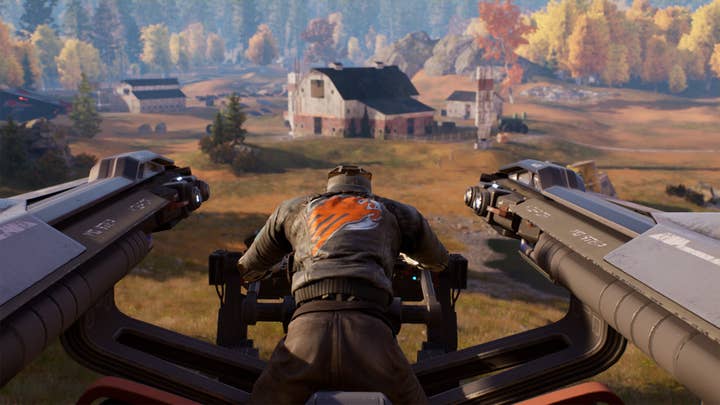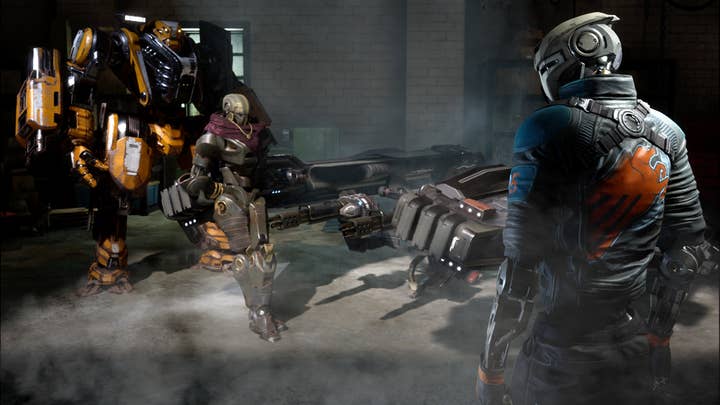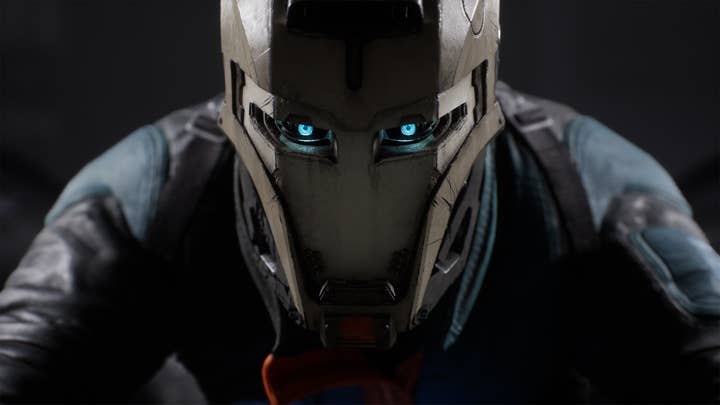V1 Interactive loves Halo, but doesn't want to be Halo
President and creative director Marcus Lehto on why he left Bungie to start a small studio making a focused, live game
When you spend over 15 years working on a game like Halo, then leave and make your own studio, people tend to have certain expectations. That's according to V1 Interactive president and creative director Marcus Lehto, who did exactly that.
"It's a challenge for us," he says, speaking to GamesIndustry.biz at PAX West. "There's a big misunderstanding from a lot of people, like 'You must be a 600-person studio.' There's just an assumption that we are huge, but we're not. We're just a 30-person team. But I think it shows the love and care we put into the game."
Lehto talks about his long career at Bungie, which began when the studio was still in Chicago and "only ten people or so." He was one of the first people to work on what became Halo, moved with the company to Seattle, and watched the franchise grow. Though he loved the experience enough to stay from working as a freelance graphic designer in 1996 all the way to serving as a creative director in 2012, the way in which Bungie transformed over the years inspired his departure to make something much smaller.
"I really wanted to get back to the best part of making games: a small team where everybody's critical to the success of what we're making"
"It went from this small family vibe to this huge thing, the team was just so immense when it moved from Halo to Destiny," he says. "And it was fun. We enjoyed it. But I really wanted to get back to the roots of what was just the best part of making games: a small team where everybody's critical to the success of what we're making. And everybody knows each other, we're all family, and we hang out together all the time. It's a good mix of seasoned devs like myself, as well as some emerging talent right out of school who are wicked smart and really good."
Shortly after departing Bungie, Lehto formed his own Redmond-based studio, V1 Interactive. At PAX, the team showcased its upcoming project, a team-based shooter called Disintegration. In the trailer, Disintegration appears to nod to the years of Halo inspiring its creative director, but Lehto emphasizes that the small team behind it means a wide array of ideas and perspectives have gone into its creation.

"The biggest difference for us is there's not a single person in the studio who has blinders on, working on this little teeny part of a project," he says. "And no one's being told what to do because that's their teeny little part, and that's what happens in a big studio. You can't have everybody steering the project one way or another. With a small studio, everyone in the studio regardless of who they are is able to give feedback on what's happening.
"And also, because we're so small, everyone wears lots of different hats depending on what day of the week it is. I like working on the game; I don't just sit around and direct, telling people what to do. I build stuff, I build missions, I build characters and animation. I love that stuff. Same with any one of our designers, engineers or whoever. Depending on what day it is or what kind of tasks are at hand, they may have to put on a different hat to fulfill that role, but that's exciting. It keeps people on their toes, and it helps them grow."
At surface level, Disintegration seems to fit into a familiar model (at least in its multiplayer) of teaming up with friends, capturing objectives, shooting bad guys. But one major distinguishing feature of the game is its rooting in the real-time strategy genre. According to Lehto, it only evolved into a shooter over time.
"There was this one fiction I kept coming back to, it's something that's really personal to me in regards to technology in our lives and how much we depend upon it"
"It started out [with a] very similar aesthetic, same characters, same ideas, you were just micromanaging them like you would [in an RTS]," Lehto says. "But the more we played it, as cool as it was, it needed something different to stand out against the crowd. That's when we decided to try turning the camera into the [player-controlled] grav cycle, making it an active participant in combat. We embraced the idea of making all the mechanics of the game feel like first-person shooters: fluid movement and the gameplay mechanics of firing your weapons and firing commands down for your units on the ground."
That doesn't mean the game doesn't still have echoes of its origins in the slower RTS genre. The player still commands AI units, though the team at V1 is working specifically to make the AI intelligent enough not to need extremely specific guidance.
"[AI] was one of our biggest challenges in developing this, taking that micromanagement aspect away from the player and not asking them to tell a unit to go here, go here," says Lehto. "No, tell the crew they should move to a location, and then they go there and do smart, autonomous things that you'd expect them to do. They take cover, they will preserve their own lives and run to other positions. That took a long time."
Disintegration isn't planned for launch until later next year, and the demos so far have included only a small slice of the multiplayer. Lehto says that it will include a story-focused campaign -- "like a Joss Whedon kind of thing" -- with a distinct vision and message, while the multiplayer is more focused on team and competitive play with friends.

"When I left Bungie, I explored a lot of different game ideas, from teeny mobile ideas to big, giant AAA game ideas that were way out of my reach," Lehto says. "But there was this one fiction I kept coming back to. It's something that's really personal to me in regards to technology in our lives and how much we depend upon it. I love it just as much as anybody else, but it worries me, and I have kids who are now in their 20s and I've seen them grow with it and adapt to it in a way that I didn't expect.
"Because we are a smaller team, it's not like we can make an epic, 60-hour campaign or something like that"
"It's kind of an allegory for what would happen if some of that is left unchecked and what might happen with it in its furthest extreme. It's also what happens if we ignore the world around us and don't pay enough attention to it. What kind of universe would be built in that? It's a universe that I just connected with personally and fell in love with, and I kept coming back to it time and time again. It was one of those many ideas I was fooling around with and I thought this one deserved more attention. And that's when I hired a couple of guys from DigiPen and we started building it. We spent almost two years building the prototype before we started pitching it around, and here we are today."
Lehto also points out another limitation of a small team that he hopes to leverage into a strength. Though it's still too early for specifics, he says Disintegration is being planned with three multiplayer modes alongside its single-player campaign. Further content is planned for post-launch, with new modes and maps added for free and cosmetic upgrades available for real money transactions.
The goal, he says, is to have a small, sturdy, and polished foundation at launch, and then to add on top of that for a long time to come.
"When we signed up with Private Division as our publisher, one of the things we all agreed on is that because we are a group of people who have seasoned developer backgrounds and understand how to make complicated games," he says. "We're going to build a game that's high-quality, first and foremost. We're focused on quality. Because we are a smaller team, it's not like we can make an epic, 60-hour campaign or something like that. It is smaller, but with the idea that we can constantly grow beyond with new modes, new maps, new crews, all kinds of cool stuff to keep the ecosystem healthy and alive.
"We're building the game as an architecture right now to support expansion. That's part of what our goal is as a small team. We're not coming out with 18 different game modes that are all half-baked. We're really focusing on making sure the game modes we do ship are as high-quality as possible."
Disclosure: PAX organizer ReedPOP is the parent company of GamesIndustry.biz.

